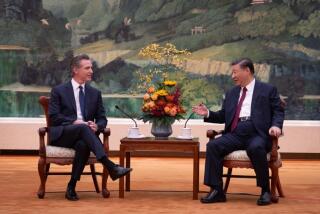Christopher to Visit China in November
- Share via
JAKARTA, Indonesia — In a fresh sign of warming U.S.-China ties, the two nations said here Wednesday that Secretary of State Warren Christopher will visit Beijing in November.
The planned visit was announced by Chinese Foreign Minister Qian Qichen immediately after a meeting with Christopher and was confirmed by a senior U.S. official who briefed reporters.
Agreement was also reached on a visit to Washington by Chinese Defense Minister Chi Haotian by the end of this year, the U.S. official said.
While the exact timing of Christopher’s visit still must be determined, it is expected to come after the November presidential election, the U.S. official said.
If President Clinton wins reelection, a topic of discussion on the trip will be an exchange of state visits between Clinton and Chinese President Jiang Zemin in 1997 or 1998, the official said.
U.S.-China relations soured in 1989 with the Chinese crackdown on pro-democracy protests in Tiananmen Square, then showed gradual recovery by 1994, when Defense Secretary William J. Perry and the late Commerce Secretary Ronald H. Brown visited.
But Sino-American relations deteriorated again last year with friction over trade, weapons proliferation and Taiwan, which Beijing views as a renegade province.
In recent months, though, both sides seem to be trying to improve relations.
“There are still going to be ups and downs in this relationship and there remain many concerns--including nonproliferation, human rights and some economic areas--and we’ve always got to make sure that the Taiwan situation remains stable,” the U.S. official said.
But “as the post-Cold War agenda unfolds . . . there are some potential areas of cooperation that are emerging,” he added. “You’ve got areas like the environment, international crime and narcotics, immigrant smuggling, as well as more traditional areas like the Korean issue, Cambodia, even some progress in nonproliferation and trade areas, however arduous the negotiations often are. So this broader agenda has emerged.”
No progress was seen Wednesday, though, on a nuclear test-ban treaty, a key issue being addressed at meetings here sponsored by the seven-member Assn. of Southeast Asian Nations, or ASEAN.
The ASEAN sessions have also featured wide-ranging security talks among countries of this region and world powers.
In his meeting with Qian, Christopher pressed for China to accept a compromise test-ban treaty as now drafted--a commitment Russia made here Tuesday. But “the Chinese were not prepared to say they could accept the present text without change,” the U.S. official said.
Qian told reporters that there should still be flexibility in negotiations over the treaty.
Before leaving Beijing for this week’s meetings here, a Chinese negotiator said China had objections to the treaty draft but hoped a test ban could be put in place this year.
“We are still short of a consensus,” the official said. “But I don’t think this is the end of the world. We still have some time” to reach agreement and send an accord to the U.N. General Assembly in the fall.
China, for example, disagrees with the draft as it deals with the detection of testing.
Beijing argues that the United States has the most sophisticated detection technology, and unless it is willing to share it, countries should be allowed to use seismic data and information only from laboratories that can measure radioactive releases.
The Chinese also want to reserve the right to conduct nonexplosive nuclear experiments and tests and they reject the proposed, simplified on-site inspection procedures, which proponents say will be easier but which China sees as open to abuse by its potential enemies.
The official said the thorniest issue to be resolved was on-site inspection.
China considers outsider visits to its nuclear research sites as a threat to its national security.
“We cannot allow one country to be the self-proclaimed international police,” the Chinese official said.
Times staff writer Maggie Farley in Beijing contributed to this report.
More to Read
Sign up for Essential California
The most important California stories and recommendations in your inbox every morning.
You may occasionally receive promotional content from the Los Angeles Times.













